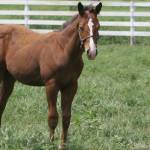Stress of Weaning Impacts Digestive Health of Foals

Had a stressful day? As taxing as it was, your anxiety was probably nothing compared to the stress foals experience during the weaning process. According to new research*, weaning is one of the most stressful events in a horse’s life.
Weaning affects physiological, nutritional, and cognitive-behavioral responses. Regardless of technique, weaning commonly results in:
- Increased frequency of vocalizations;
- Increased general motor activity during the first few days;
- Altered feeding and sleeping patterns;
- Irritability, anxiousness, and aggressiveness;
- Suspension of normal play behavior;
- Elevated glucocorticoid (stress hormone) levels; and
- Weight loss, performance decline after weaning, and higher risk of infectious diseases.
“Based on the study by Mach and colleagues, increased circulating stress hormones can negatively impact the gastrointestinal tract of foals during weaning. Specifically, those hormones could alter the intestinal microbiome, potentially allowing for overgrowth of harmful organisms such as Escherichia coli,” explained Kathleen Crandell, Ph.D., nutritionist at Kentucky Equine Research (KER).
To increase our understanding of stress, weaning, and the intestinal microbiome, 34 foals were divided into two groups: those abruptly weaned from their mares and those progressively weaned over four weeks by spending increasing periods of time separated from their dams. Both of these weaning methods are common in the breeding industry.
After analyzing the intestinal microbiomes of all foals before and during the weaning process, the researchers found that before complete separation from their dams beneficial species of microorganisms were more abundant in the group of abruptly weaned foals.
“This finding suggests that progressive weaning of foals was causing stress changes throughout the pre-weaning period, and that the foals weaned abruptly have intestinal microbiomes that are better adapted for weaning,” Crandell explained. “However, the researchers also noted higher salivary cortisol levels in the abruptly weaned foals than the progressive group at separation, indicating that the animals were more stressed.”
On the flip side, fungal loads, which are thought to foster fermentation, were higher in the foals progressively weaned.
Regardless of weaning method, foals with so-called “community type 2” microbiomes (containing higher amounts of Eubacterium, Coprococcus, Clostridium XI, and Blautia spp.) had lower salivary cortisol levels and a higher average daily weight gain.
Unsure of when or how to proceed with weaning or what type of feed you should be offering to a weanling? Consult with a KER equine nutrition advisor. In the meantime, consider these nutritional strategies for weanlings.
*Mach, N, A. Foury, S. Kittelmann, et al. 2017. The effects of weaning methods on gut microbiota composition and horse physiology. Frontiers in Physiology. 8:535.








